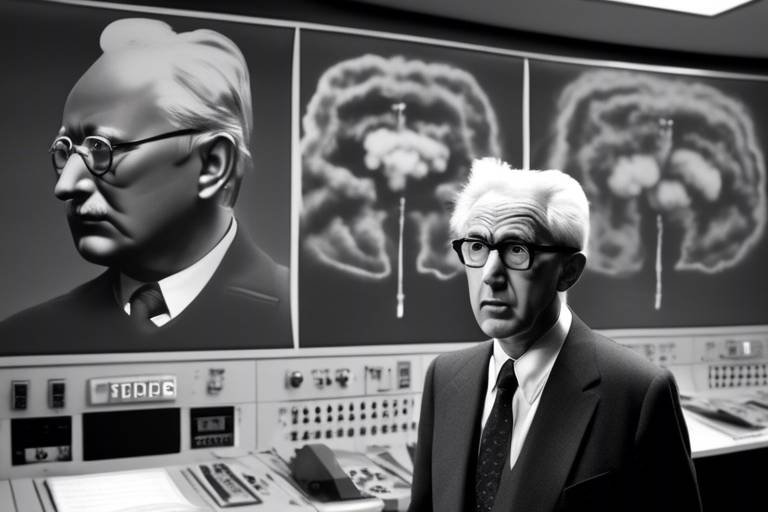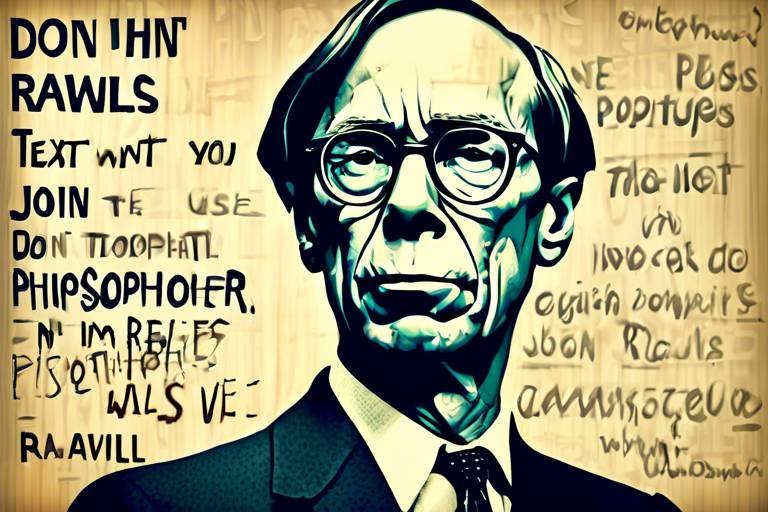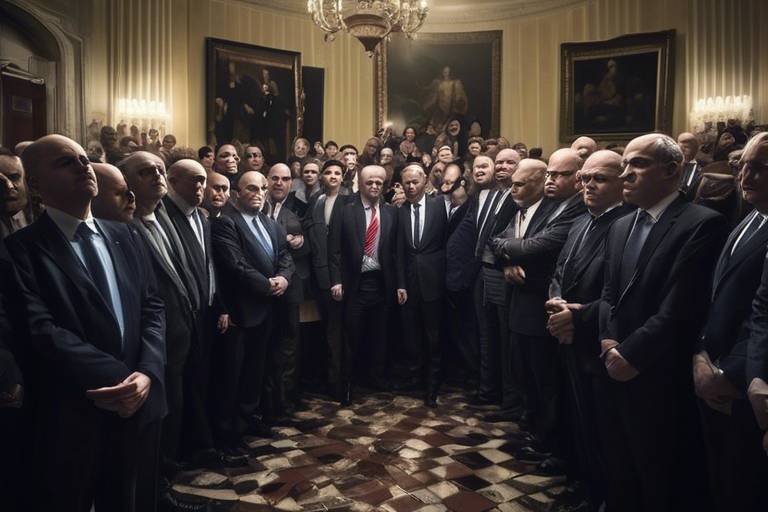Poststructuralist Philosophy and its Impact on Politics
This article explores the intersection of poststructuralist philosophy and political thought, examining how this theoretical framework challenges traditional political ideologies and practices, and its implications for contemporary governance and social movements.
Poststructuralism is a philosophical movement that critiques fixed meanings and structures. It emphasizes the fluidity of language and identity, challenging the notion of absolute truths in political discourse, thus reshaping our understanding of power and governance. Imagine a world where every word carries a weight that shifts depending on who speaks it and how it's interpreted. This is the essence of poststructuralism. It invites us to question the very frameworks we rely on to understand political realities, revealing that meanings are not set in stone but are rather a dance of interpretations, influenced by context, culture, and power dynamics.
Notable figures such as Michel Foucault and Jacques Derrida have significantly contributed to poststructuralist thought. Their ideas on power, deconstruction, and discourse provide essential insights into how political ideologies are constructed and contested in society. Foucault's exploration of power as something that circulates rather than simply being held by the state challenges us to rethink how we understand authority and governance. Meanwhile, Derrida's approach to deconstruction invites us to peel back the layers of political language, exposing the contradictions that lie beneath. Together, their work forms a robust framework for analyzing the complexities of modern political landscapes.
Foucault's analysis of power dynamics reveals how power is not merely repressive but also productive. His theories help us understand how power operates within institutions and shapes societal norms, influencing political practices. For instance, consider how societal expectations around behavior can shape laws and regulations. Foucault argues that power is everywhere, embedded in our daily practices and institutional frameworks. This perspective encourages us to scrutinize not just the overt expressions of power but also the subtle ways in which it permeates our lives and influences our choices.
Foucault's notion of disciplinary power illustrates how modern governance employs surveillance and normalization to regulate behavior. This framework invites critical reflection on the implications for individual freedom and state control. Think about the ways in which surveillance technologies have become commonplace in our societies. Are they tools for safety, or do they represent a new form of control? By analyzing these technologies through a poststructuralist lens, we can better understand the complex relationship between governance and individual autonomy.
Foucault also discusses resistance as an inherent aspect of power relations. Understanding counter-conduct reveals how marginalized groups can challenge dominant political narratives and practices, fostering social change. This idea of resistance is crucial; it empowers us to recognize that where there is power, there is also the potential for opposition. Movements advocating for social justice, environmental protection, and human rights often emerge from this very resistance, illustrating that change is possible even within oppressive structures.
Derrida's deconstruction serves as a method for analyzing political texts and ideologies. By revealing inherent contradictions, it encourages a more nuanced understanding of political language and its implications for meaning-making in governance. When we deconstruct political speeches or policy documents, we uncover the layers of meaning that can often be obscured. This approach not only challenges the status quo but also opens up space for alternative interpretations and solutions to political issues.
Poststructuralism has significantly influenced identity politics by emphasizing the fluidity of identity. This perspective challenges essentialist views, encouraging a more inclusive approach to representation and political engagement among diverse social groups. In a world where identities are multifaceted and constantly evolving, understanding this fluidity is essential for fostering inclusive political dialogue. It allows for a recognition of the intersecting identities that individuals embody and the unique experiences they bring to the political arena.
The concept of intersectionality, rooted in poststructuralist thought, highlights how various social identities intersect to shape individuals' experiences. This understanding is vital for addressing systemic inequalities within political frameworks. By recognizing that people do not exist in isolated categories but rather as a tapestry of intersecting identities, policymakers can create more effective and equitable solutions that resonate with diverse populations.
Poststructuralism critiques normative political theories that rely on fixed categories. By questioning these assumptions, it opens the door for alternative political practices that prioritize plurality and complexity in societal governance. This shift is crucial in a world that is increasingly recognizing the importance of diversity and representation in decision-making processes. Embracing complexity allows for a richer, more vibrant political discourse that reflects the realities of our multifaceted societies.
Language plays a crucial role in shaping political realities. Poststructuralist thought emphasizes the significance of discourse in constructing political identities, ideologies, and power relations, highlighting the need for critical language awareness in politics. The way we frame issues can fundamentally alter public perception and policy outcomes. For instance, consider how the terminology used to discuss immigration can evoke different emotional responses and shape public opinion.
Discourse analysis, informed by poststructuralist philosophy, examines how language influences political narratives. This approach uncovers the underlying assumptions and power dynamics that shape public perception and policy-making. By analyzing the language used in political debates and media coverage, we can better understand how certain narratives gain traction while others are marginalized.
Rhetoric shapes political mobilization and public opinion. Understanding the poststructuralist perspective on rhetoric allows for a critical examination of how language can both empower and manipulate political action in society. The power of rhetoric lies in its ability to resonate with people's emotions and experiences, making it a potent tool for both advocates and opponents of various political agendas. By critically engaging with rhetoric, we can become more discerning consumers of political messages and advocates for more authentic and inclusive discourse.
- What is poststructuralism?
Poststructuralism is a philosophical movement that critiques fixed meanings and structures, emphasizing the fluidity of language and identity. - How does poststructuralism impact politics?
It challenges traditional political ideologies, promotes inclusivity, and encourages critical examination of power dynamics and language. - Who are the key thinkers in poststructuralism?
Notable figures include Michel Foucault and Jacques Derrida, whose ideas on power and deconstruction have significantly influenced political thought.

Understanding Poststructuralism
Poststructuralism is not just a philosophical movement; it's a radical shift in how we perceive meaning, identity, and power. At its core, poststructuralism challenges the idea that meanings are fixed and that language can neatly encapsulate reality. Instead, it proposes that meanings are fluid, constantly shifting based on context, culture, and individual interpretation. This perspective invites us to reconsider the **traditional political ideologies** that often rely on rigid definitions and absolute truths.
Imagine a world where the words we use are like water, flowing and changing shape depending on the container they’re in. This analogy captures the essence of poststructuralist thought. It suggests that language is not a straightforward tool for communication but rather a complex web of connections that shapes our understanding of the world. In political discourse, this means that the way we articulate our beliefs and values can significantly influence how they are perceived and enacted in society.
One of the most compelling aspects of poststructuralism is its critique of the **notion of absolute truths**. It argues that what we often consider to be "truth" in political discussions is heavily influenced by power dynamics and social constructs. This realization encourages us to question the narratives that dominate our political landscape. Are they truly reflective of reality, or are they merely products of specific historical and cultural contexts? By engaging with these questions, we can develop a more nuanced understanding of governance and power relations.
Poststructuralism also emphasizes the importance of **context** in shaping meaning. It posits that individual identities are not static but rather constructed through interactions with others and influenced by various social factors. This perspective is crucial in understanding how political ideologies are formed and contested. For instance, consider how different social groups may interpret the same political message in diverse ways based on their unique experiences and backgrounds. This variability underscores the importance of inclusive dialogue in political processes.
In summary, poststructuralism invites us to embrace complexity and ambiguity in our understanding of political ideologies. By acknowledging the fluidity of language and identity, we can challenge the **traditional norms** that often limit our political engagement. This philosophical framework not only reshapes our comprehension of power and governance but also empowers marginalized voices to emerge and challenge dominant narratives. As we proceed further into the complexities of poststructuralist thought, we will explore its key thinkers and their profound impact on contemporary politics.

Key Thinkers in Poststructuralism
When diving into the depths of poststructuralist thought, we encounter a few towering figures whose ideas have reshaped our understanding of politics and society. Among these, Michel Foucault and Jacques Derrida stand out as pivotal thinkers. Their contributions not only challenge conventional political ideologies but also provide a lens through which we can critically analyze the structures that govern our lives.
Foucault's work primarily revolves around the concept of power. He argues that power is not just repressive; it is also productive. This means that power shapes our identities, our behaviors, and the very norms that dictate how we interact within society. For instance, his exploration of institutions—like prisons, schools, and hospitals—reveals how these entities wield power through surveillance and disciplinary measures. In a way, Foucault invites us to consider how we are all participants in a complex web of power relations.
On the other hand, Derrida's approach is characterized by deconstruction, a method that seeks to unveil the contradictions within political texts and ideologies. By dissecting language, Derrida encourages us to question the meanings we often take for granted. His insights help us understand that political language is not just a tool for communication; it is a powerful instrument that shapes our perceptions and beliefs. In this light, language becomes a battleground where meanings are contested and redefined.
To further illustrate their influence, let’s consider some of the key ideas associated with these thinkers:
| Thinker | Key Concepts |
|---|---|
| Michel Foucault |
|
| Jacques Derrida |
|
In essence, both Foucault and Derrida challenge us to rethink the foundations of political thought. They push us to recognize that our understanding of power, identity, and language is not static but rather fluid and dynamic. As we engage with their ideas, we are encouraged to embrace complexity and plurality in our political discourse, paving the way for more inclusive and diverse perspectives in contemporary governance.

Foucault's Concept of Power
When we think about power, many of us picture it as a rigid structure, something that can be held, controlled, or wielded by individuals or institutions. However, Michel Foucault flips this notion on its head. He argues that power is not merely repressive; rather, it is a complex web of relationships that permeates every aspect of society. This perspective invites us to rethink how we understand authority, governance, and even our own identities.
Foucault introduces the idea that power is productive, meaning it creates realities, social norms, and even knowledge. It’s not just about saying “no” or imposing limits; it’s also about shaping what we consider to be true or acceptable. For instance, think about how societal norms dictate everything from fashion choices to political ideologies. This power shapes our perceptions and behaviors, often without us even realizing it.
One of Foucault's key contributions is his analysis of disciplinary power. This concept illustrates how modern societies regulate behavior through various institutions—like schools, prisons, and hospitals—by establishing norms and expectations. Disciplinary power operates through surveillance and normalization, which means that we are constantly being watched and judged based on societal standards. This raises important questions about individual freedom and the extent to which the state can control personal behavior.
Moreover, Foucault emphasizes that power is not something that one possesses; instead, it is a dynamic force that flows through social interactions. This means that power can be both oppressive and liberating, depending on the context. In his view, even those who are marginalized can exert power through resistance. For instance, consider social movements that challenge dominant narratives—these movements illustrate how power can be contested and redefined. Foucault argues that resistance is not just a reaction to power; it is an integral part of the power relationship itself.
To illustrate this concept, let’s look at a few ways power manifests in society:
- Institutions: Schools and prisons not only enforce rules but also shape our understanding of normality.
- Surveillance: The constant monitoring of behavior can lead to self-regulation, where individuals conform to societal expectations.
- Resistance: Social movements and protests serve as forms of resistance that challenge established power structures.
Foucault's ideas compel us to examine the nuances of power in our everyday lives. They challenge us to ask: How do we navigate the power dynamics in our relationships? How do societal norms influence our choices? By understanding power as a fluid and pervasive force, we can better recognize the ways in which we are both shaped by and can shape the world around us.

Disciplinary Power and Governance
Foucault's concept of disciplinary power fundamentally reshapes our understanding of governance in modern societies. Rather than merely being a force that oppresses, disciplinary power operates through subtle mechanisms of control that regulate behavior and maintain social order. This form of power is not just imposed from above; it permeates institutions, practices, and everyday life, shaping how individuals perceive themselves and their roles within society.
At the heart of disciplinary power is the notion of surveillance. Think about it: we live in a world where surveillance is ubiquitous, from CCTV cameras in public spaces to the data collection practices of tech companies. These mechanisms serve to monitor behavior, ensuring compliance with societal norms and expectations. Foucault argues that this constant observation leads individuals to self-regulate, as they internalize the norms they are expected to follow. In this way, the state does not need to impose control through force alone; instead, individuals become complicit in their own governance.
Moreover, the concept of normalization is crucial in understanding how disciplinary power functions. Normalization refers to the process by which certain behaviors, attitudes, and identities are deemed 'normal' while others are marginalized or pathologized. This creates a framework within which individuals are evaluated and categorized. For instance, in educational settings, students are often assessed against standardized criteria that promote conformity and discourage deviation. This can stifle creativity and individuality, leading to a homogenized society where differences are suppressed.
To illustrate the implications of disciplinary power, consider the following table that summarizes key aspects:
| Aspect | Description |
|---|---|
| Surveillance | Monitoring behavior to ensure compliance with societal norms. |
| Normalization | Establishing standards of behavior that individuals are expected to adhere to. |
| Self-regulation | Individuals internalize norms and regulate their own behavior accordingly. |
| Institutional Influence | Institutions such as schools and prisons enforce norms and expectations. |
Understanding disciplinary power also invites us to critically reflect on the implications for individual freedom. As we navigate through a landscape marked by constant surveillance, we must ask ourselves: to what extent are we truly free? Are our choices genuinely our own, or are they shaped by the invisible hand of governance that dictates what is acceptable? This critical reflection is essential for fostering a society that values individual autonomy while recognizing the complex interplay of power and control.
In conclusion, Foucault's exploration of disciplinary power reveals the intricate ways in which governance operates in contemporary society. It challenges us to reconsider our assumptions about power and authority, urging a more nuanced understanding of how we navigate our identities and relationships within the frameworks of modern governance.
- What is disciplinary power? Disciplinary power refers to the subtle mechanisms of control that regulate behavior in society, primarily through surveillance and normalization.
- How does surveillance affect individual behavior? Surveillance encourages individuals to self-regulate their actions to conform to societal norms, leading to a form of internalized control.
- What role does normalization play in governance? Normalization establishes standards for acceptable behavior, often marginalizing those who do not conform, thereby shaping societal expectations.
- Can individuals resist disciplinary power? Yes, individuals can resist by challenging societal norms and advocating for alternative perspectives, fostering a more inclusive society.

Resistance and Counter-Conduct
Resistance and counter-conduct are pivotal concepts in Michel Foucault's exploration of power dynamics. Foucault posits that power is not a one-way street; instead, it is a complex web of relationships that shapes and is shaped by resistance. This means that where there is power, there is also the potential for resistance. It's like a dance where every move is met with a counter-move, creating a dynamic interplay that can lead to significant social change.
One of the most fascinating aspects of Foucault's theory is the idea that resistance is not merely a reaction to power but an integral part of the power structure itself. This challenges the traditional view that power is solely repressive. Instead, power can be seen as productive, generating new forms of knowledge and social practices. In this sense, resistance can take many forms, from overt protests to subtle acts of defiance, and it often emerges from marginalized groups who challenge the status quo.
To illustrate this concept, consider the following examples of resistance:
- Social Movements: Movements like Black Lives Matter or LGBTQ+ rights campaigns are prime examples of how marginalized communities can mobilize against dominant narratives, pushing back against systemic injustices.
- Art and Literature: Artists and writers often use their platforms to critique societal norms and challenge oppressive systems, providing a voice for those who may be silenced.
- Everyday Acts of Defiance: Small, everyday actions—like refusing to conform to societal expectations or questioning authority—can also serve as forms of resistance that collectively contribute to larger movements.
Foucault also introduces the term "counter-conduct," which refers to practices of resistance that not only oppose dominant power structures but also create alternative ways of living. This can be seen in the rise of grassroots organizations that prioritize community well-being over institutional mandates, fostering a sense of agency among individuals. Counter-conduct is about reimagining possibilities and finding new paths that diverge from traditional power dynamics.
In essence, understanding resistance and counter-conduct through a poststructuralist lens allows us to see the myriad ways individuals and groups can challenge power structures. It emphasizes that resistance is not just about opposing authority but also about creating spaces for alternative narratives and practices that can lead to transformative social change. This perspective is crucial in contemporary politics, where the lines between power and resistance continue to blur, revealing the intricate dance of societal dynamics.
- What is poststructuralism? Poststructuralism is a philosophical movement that critiques fixed meanings and structures, emphasizing the fluidity of language and identity.
- Who are key thinkers in poststructuralism? Notable figures include Michel Foucault and Jacques Derrida, who have significantly influenced poststructuralist thought.
- How does Foucault define power? Foucault sees power as not merely repressive but also productive, shaping societal norms and institutions.
- What is the role of resistance in power dynamics? Resistance is an integral part of power relations, emerging as a response to dominant structures and creating alternative practices.
- What is counter-conduct? Counter-conduct refers to practices that oppose dominant power while also fostering alternative ways of living and engaging with society.

Derrida and Deconstruction in Politics
Jacques Derrida, a pivotal figure in poststructuralist philosophy, introduced the concept of deconstruction, which has profound implications for political thought. At its core, deconstruction is not merely about tearing down texts or ideas; rather, it involves a critical examination of the underlying assumptions and contradictions that shape our understanding of political ideologies. Imagine peeling back layers of an onion, where each layer reveals more complexity and nuance—this is akin to how deconstruction works in the realm of politics.
Derrida's approach encourages us to question the stability of meaning in political discourse. Political texts are often laden with assumptions that go unchallenged, leading to a simplistic understanding of complex issues. By applying deconstruction, we can uncover the hidden biases and contradictions within these texts, allowing for a more comprehensive understanding of the political landscape. For instance, consider the term "freedom." On the surface, it appears straightforward, but deconstructing its usage in various political contexts reveals differing interpretations that can significantly affect policy and governance.
One of the key contributions of Derrida to political philosophy is his emphasis on the role of language in shaping our realities. Language is not just a tool for communication; it actively constructs our perceptions of truth and power. Derrida argues that meanings are not fixed but are instead fluid and context-dependent. This perspective challenges the idea of a singular political truth, highlighting instead a multiplicity of meanings that can coexist. This fluidity opens up space for alternative narratives and marginalized voices, which are often overlooked in traditional political discourse.
Moreover, deconstruction invites us to reflect on the implications of binary oppositions in political thought, such as liberal vs. conservative or us vs. them. These binaries simplify complex realities and can lead to divisive politics. By deconstructing these oppositions, we can reveal the spectrum of beliefs and values that exist, promoting a more inclusive and nuanced understanding of political identities. This approach not only enriches political discourse but also fosters empathy and dialogue among diverse groups.
In practical terms, applying deconstruction to political texts can take various forms. For instance, one might analyze speeches, policy documents, or media representations to identify the underlying assumptions that inform them. This process often reveals how language can be manipulated to serve specific political agendas. By critically engaging with political rhetoric, we can become more discerning consumers of information and more effective participants in democratic processes.
In conclusion, Derrida's deconstruction offers a powerful lens through which to examine political ideologies and practices. It challenges us to look beyond surface meanings and to engage with the complexities of language and power. By embracing this approach, we can cultivate a more dynamic and inclusive political discourse that acknowledges the richness of human experience and the multiplicity of voices within society.
- What is poststructuralism? - Poststructuralism is a philosophical movement that critiques fixed meanings and structures, emphasizing the fluidity of language and identity.
- How does Derrida's deconstruction apply to politics? - Derrida's deconstruction reveals the contradictions in political texts, encouraging a more nuanced understanding of political language and ideologies.
- Why is language important in politics? - Language shapes our perceptions of power and identity, and understanding its role can help us critically engage with political narratives.
- What is the significance of intersectionality in poststructuralism? - Intersectionality highlights how various social identities intersect, shedding light on systemic inequalities and promoting inclusivity in political discourse.

Poststructuralism and Identity Politics
Poststructuralism has profoundly influenced the landscape of identity politics, reshaping how we understand and engage with identity in the political realm. At its core, poststructuralism challenges the idea of fixed identities, advocating for a view of identity as fluid and dynamic. This perspective is crucial in a world where individuals often navigate multiple identities based on race, gender, sexuality, and class. By rejecting essentialist notions, poststructuralism encourages a more inclusive approach to representation and political engagement.
One of the most significant contributions of poststructuralist thought to identity politics is the concept of intersectionality. This framework emphasizes that various social identities do not exist in isolation but intersect to shape unique experiences. For instance, a Black woman may face different challenges than a White woman or a Black man, highlighting the need for nuanced political discourse that recognizes these complexities. Understanding intersectionality is vital for addressing systemic inequalities that permeate political frameworks.
Furthermore, poststructuralism critiques normative political theories that rely on rigid categories. Traditional political ideologies often simplify identities into binary oppositions, neglecting the rich tapestry of human experience. By questioning these assumptions, poststructuralism opens the door for alternative political practices that prioritize plurality and complexity. This shift encourages political movements to embrace a broader spectrum of voices, fostering a more democratic and representative governance.
In practical terms, the implications of poststructuralism for identity politics are profound. Activists and political leaders are increasingly recognizing the importance of inclusive dialogues that reflect the diverse identities within society. This approach not only enhances representation but also empowers marginalized groups, allowing them to challenge dominant narratives and advocate for their rights. The recognition of fluid identities fosters solidarity among various social movements, creating a powerful coalition for social change.
In conclusion, poststructuralism's impact on identity politics is transformative. By embracing the fluidity of identity and advocating for intersectional approaches, it challenges traditional political ideologies and practices. As we move forward, the lessons of poststructuralism remind us that understanding the complexities of identity is essential for fostering an equitable and just society.
- What is poststructuralism? Poststructuralism is a philosophical movement that critiques fixed meanings and structures, emphasizing the fluidity of language and identity.
- How does poststructuralism influence identity politics? It challenges essentialist views of identity, promoting a more inclusive approach that recognizes the intersectionality of various social identities.
- What is intersectionality? Intersectionality is a framework that examines how different social identities intersect and shape individual experiences, highlighting systemic inequalities.
- Why is fluidity in identity important? Recognizing fluidity allows for a more nuanced understanding of identity, fostering inclusivity and representation in political discourse.

Intersectionality in Political Discourse
Intersectionality, a concept that has gained traction within poststructuralist thought, serves as a powerful lens for understanding the complexities of social identities and their interplay in political discourse. At its core, intersectionality recognizes that individuals do not exist in isolation; rather, they are shaped by a multitude of overlapping identities, including but not limited to race, gender, class, sexuality, and ability. This multifaceted approach challenges the idea that political experiences can be generalized across a singular identity, urging us to consider how various forms of oppression and privilege intersect to influence individuals' lives.
For instance, consider the different experiences of a Black woman compared to a white woman or a Black man. While all three may face gender-based discrimination, the Black woman navigates a unique set of challenges that stem from both her race and gender. This intersectional perspective is crucial in political discourse as it highlights the need for inclusive policies that address the specific needs of diverse groups. By acknowledging the intersections of identity, policymakers can better understand the complexities of social justice and equity.
Moreover, intersectionality encourages a more nuanced dialogue around representation in politics. It pushes for the inclusion of voices that have historically been marginalized or silenced, advocating for a political landscape that reflects the diversity of society. This approach not only enriches political discussions but also fosters a sense of belonging among various social groups, empowering them to engage actively in the political process.
To illustrate the importance of intersectionality in political discourse, we can look at the following table that summarizes how different identities can intersect and the implications for political engagement:
| Identity Factor | Potential Challenges | Political Implications |
|---|---|---|
| Race | Systemic racism, discrimination | Need for policies addressing racial inequality |
| Gender | Gender-based violence, pay gap | Advocacy for gender equity in legislation |
| Class | Poverty, lack of access to resources | Emphasis on economic justice initiatives |
| Sexuality | Homophobia, lack of representation | Support for LGBTQ+ rights and visibility |
In summary, intersectionality in political discourse not only enriches our understanding of social dynamics but also serves as a call to action for more inclusive and equitable political practices. By embracing the complexity of identities, we can work towards a political framework that truly represents and addresses the needs of all individuals, paving the way for a more just society.
- What is intersectionality? Intersectionality is a framework for understanding how various social identities overlap and intersect, influencing individuals' experiences of oppression and privilege.
- Why is intersectionality important in politics? It is crucial because it highlights the diverse experiences of individuals, ensuring that policies address the specific needs of different groups rather than assuming a one-size-fits-all approach.
- How can intersectionality improve political representation? By advocating for the inclusion of marginalized voices, intersectionality promotes a political landscape that reflects the diversity of society, leading to more equitable policies.

Challenging Normative Political Theories
In the landscape of political thought, normative political theories have long held sway, presenting rigid frameworks that often dictate how we perceive justice, governance, and social order. However, poststructuralism steps into this arena like a breath of fresh air, questioning the very foundations upon which these theories stand. Instead of accepting fixed categories and universal truths, poststructuralism invites us to embrace a more pluralistic and complex understanding of political life.
This critique is particularly vital in a world where social identities and experiences are increasingly recognized as diverse and multifaceted. By challenging the assumptions underlying normative theories, poststructuralism opens the door to alternative political practices that reflect the realities of contemporary society. It pushes us to consider questions like: What if justice is not a one-size-fits-all concept? What if governance can take forms that are not strictly hierarchical?
One of the essential contributions of poststructuralism is its emphasis on the contextual nature of political theories. Normative theories often arise from specific historical and cultural contexts, which can render them inadequate when applied universally. For instance, the notion of democracy in the West may not hold the same meaning or applicability in non-Western societies. Poststructuralism encourages us to recognize these differences and to engage with political theories that are rooted in local experiences and realities.
Moreover, by exposing the inherent contradictions within normative frameworks, poststructuralism encourages a more dynamic engagement with political ideologies. This means that instead of merely accepting the status quo, we can actively deconstruct and reconstruct our understanding of politics. For example, the idea of equality can be examined through various lenses, revealing the complexities and challenges that arise when we try to implement it in practice.
To illustrate this point, consider the following table that summarizes key differences between normative political theories and poststructuralist approaches:
| Aspect | Normative Political Theories | Poststructuralist Approaches |
|---|---|---|
| View on Truth | Believes in absolute truths | Emphasizes relative truths |
| Identity | Fixed categories | Fluid and dynamic identities |
| Governance | Hierarchical structures | Diverse forms of governance |
| Social Justice | Universal standards | Contextual and pluralistic |
In conclusion, the challenge posed by poststructuralism to normative political theories is not just academic; it has real-world implications. By recognizing the limitations of fixed categories and embracing a more nuanced understanding of political realities, we can foster a political discourse that is more inclusive and reflective of the diverse society we inhabit. This shift not only enriches our political discussions but also empowers marginalized voices that have traditionally been excluded from normative frameworks.
- What is poststructuralism? Poststructuralism is a philosophical movement that critiques fixed meanings and structures, emphasizing the fluidity of language and identity.
- How does poststructuralism challenge traditional political theories? It questions the assumptions of normative theories, advocating for a more pluralistic and context-driven approach to politics.
- Who are the key thinkers associated with poststructuralism? Notable figures include Michel Foucault and Jacques Derrida, who have contributed significantly to the understanding of power and discourse.
- Why is language important in poststructuralist thought? Language shapes political realities and identities; thus, understanding its role is crucial for analyzing power dynamics in governance.

The Role of Language in Politics
Language is not just a tool for communication; it is a powerful instrument that shapes our political realities. In the realm of politics, the words we choose can influence public perception, drive narratives, and even dictate policy outcomes. Poststructuralist thought emphasizes this significance by illustrating how discourse constructs political identities, ideologies, and power relations. Have you ever considered how a single phrase can ignite a movement or how the choice of words in a political speech can sway an entire electorate? This is where the magic—and the danger—of language lies.
At its core, language is fluid and context-dependent. Poststructuralists argue that meanings are not fixed; instead, they evolve based on cultural, social, and historical contexts. This fluidity allows for a dynamic interplay between language and politics, where the same word can evoke different responses depending on the audience. For instance, terms like "freedom," "democracy," and "justice" can be interpreted in myriad ways, often leading to conflicting political ideologies. The challenge is to navigate this complexity and understand how language can both empower and manipulate.
Discourse analysis, a method rooted in poststructuralist philosophy, provides a lens through which we can examine the intricate relationship between language and politics. By analyzing political speeches, media reports, and public statements, we can uncover the underlying assumptions and power dynamics that shape our understanding of political issues. For example, consider the rhetoric surrounding immigration debates. The language used to describe immigrants—whether as "refugees," "migrants," or "illegals"—not only reflects societal attitudes but also influences public policy and individual perceptions.
Moreover, rhetoric plays a crucial role in political mobilization. Politicians and activists harness the power of language to rally support, frame issues, and galvanize action. A compelling narrative can inspire a community to come together for a cause, while a poorly chosen word can alienate potential allies. The effectiveness of political rhetoric often hinges on its ability to resonate with the audience's emotions and experiences. This is why understanding the poststructuralist perspective on rhetoric is essential for anyone engaged in political discourse.
To illustrate the role of language in politics further, consider the following table that highlights how language shapes political outcomes:
| Language Element | Impact on Politics |
|---|---|
| Framing | Shapes how issues are perceived and prioritized. |
| Metaphor | Influences emotional responses and understanding. |
| Rhetorical Questions | Engages the audience and provokes thought. |
| Repetition | Reinforces ideas and makes them memorable. |
As we navigate the complexities of political discourse, it becomes clear that language is not merely a backdrop to political action; it is a central player in shaping our political landscape. By critically engaging with the language used in politics, we can better understand the motivations behind political actions and the implications of various narratives. So, the next time you hear a political speech or read an article, ask yourself: what language is being used, and how does it influence the message being conveyed?
- What is poststructuralism? Poststructuralism is a philosophical movement that critiques fixed meanings and structures, emphasizing the fluidity of language and identity.
- How does language influence politics? Language shapes political realities by constructing identities, framing issues, and influencing public perception and policy outcomes.
- What is discourse analysis? Discourse analysis examines how language influences political narratives and uncovers underlying assumptions and power dynamics.
- Why is rhetoric important in politics? Rhetoric is crucial for political mobilization, as it can inspire action, frame issues, and sway public opinion.

Discourse Analysis in Political Contexts
Discourse analysis, a method deeply rooted in poststructuralist philosophy, serves as a powerful tool for unraveling the intricate ways in which language shapes political realities. At its core, this approach examines not just what is said, but how it is said, revealing the underlying assumptions that influence political narratives. Imagine language as a double-edged sword; it can both illuminate and obscure, empower and manipulate. This duality is essential for understanding the dynamics of political discourse.
In political contexts, discourse analysis helps us to uncover the power relations embedded within language. For instance, consider how certain phrases or terminologies can frame an issue in a particular light, steering public perception and policy decisions. By analyzing the language used in political speeches, media reports, and even social media posts, we can identify the strategies employed to shape opinions and mobilize action. This analysis often reveals a pattern of exclusion and inclusion, where specific voices are amplified while others are marginalized.
Moreover, discourse analysis can be categorized into various dimensions, each shedding light on different aspects of political communication. These dimensions include:
- Lexical Choices: The specific words chosen can carry significant weight, influencing how messages are received.
- Framing: How an issue is framed can dramatically alter public perception and response.
- Intertextuality: The relationship between different texts can reveal how political narratives evolve and are contested over time.
For example, a politician might refer to a controversial policy as a "necessary reform" rather than a "harsh cut," thereby framing the discussion in a more favorable light. Such lexical choices are not merely stylistic; they are strategic, aiming to construct a narrative that resonates with the audience's values and beliefs. In this way, discourse analysis becomes a lens through which we can critically assess the effectiveness of political communication.
Furthermore, discourse analysis extends beyond textual analysis; it encompasses the broader social context in which language is produced and consumed. This means considering the audience's reactions and the societal norms that inform their interpretations. The interplay between language and context is crucial for understanding how political messages are constructed and received. Just as a painter uses different colors to create a masterpiece, politicians and activists utilize language to paint their visions of reality.
In conclusion, discourse analysis in political contexts is not merely an academic exercise; it is a vital practice for anyone seeking to navigate the complex landscape of modern politics. By critically engaging with the language of politics, we can uncover the hidden agendas and power dynamics that shape our world. This understanding empowers us to challenge dominant narratives and advocate for a more equitable political discourse.
- What is discourse analysis? Discourse analysis is a method for studying language in its social context, examining how language shapes and is shaped by power dynamics.
- How does discourse analysis relate to politics? Discourse analysis helps to uncover the ways in which political language influences public perception and shapes political realities.
- Why is language important in politics? Language is crucial in politics because it constructs identities, frames issues, and can manipulate public opinion.
- Can discourse analysis reveal biases in political communication? Yes, by analyzing the language used, discourse analysis can expose biases and underlying assumptions in political messaging.

The Impact of Rhetoric on Political Action
This article explores the intersection of poststructuralist philosophy and political thought, examining how this theoretical framework challenges traditional political ideologies and practices, and its implications for contemporary governance and social movements.
Poststructuralism is a philosophical movement that critiques fixed meanings and structures. It emphasizes the fluidity of language and identity, challenging the notion of absolute truths in political discourse, thus reshaping our understanding of power and governance.
Notable figures such as Michel Foucault and Jacques Derrida have significantly contributed to poststructuralist thought. Their ideas on power, deconstruction, and discourse provide essential insights into how political ideologies are constructed and contested in society.
Foucault's analysis of power dynamics reveals how power is not merely repressive but also productive. His theories help us understand how power operates within institutions and shapes societal norms, influencing political practices.
Foucault's notion of disciplinary power illustrates how modern governance employs surveillance and normalization to regulate behavior. This framework invites critical reflection on the implications for individual freedom and state control.
Foucault also discusses resistance as an inherent aspect of power relations. Understanding counter-conduct reveals how marginalized groups can challenge dominant political narratives and practices, fostering social change.
Derrida's deconstruction serves as a method for analyzing political texts and ideologies. By revealing inherent contradictions, it encourages a more nuanced understanding of political language and its implications for meaning-making in governance.
Poststructuralism has significantly influenced identity politics by emphasizing the fluidity of identity. This perspective challenges essentialist views, encouraging a more inclusive approach to representation and political engagement among diverse social groups.
The concept of intersectionality, rooted in poststructuralist thought, highlights how various social identities intersect to shape individuals' experiences. This understanding is vital for addressing systemic inequalities within political frameworks.
Poststructuralism critiques normative political theories that rely on fixed categories. By questioning these assumptions, it opens the door for alternative political practices that prioritize plurality and complexity in societal governance.
Language plays a crucial role in shaping political realities. Poststructuralist thought emphasizes the significance of discourse in constructing political identities, ideologies, and power relations, highlighting the need for critical language awareness in politics.
Rhetoric is not just a tool for persuasion; it is the very fabric of political action. When politicians speak, they are not merely communicating information; they are crafting narratives that can mobilize entire populations. Think about it: a single speech can ignite a movement, sway public opinion, or even change the course of history. This is the power of rhetoric.
In the poststructuralist view, rhetoric is a dynamic and fluid force that shapes our understanding of political realities. It constructs identities, frames issues, and influences the perception of power. The way something is said can often be just as important, if not more so, than what is actually said. For instance, consider how the choice of words can evoke emotions, create solidarity, or incite fear. Politicians often use rhetoric strategically to:
- Frame Issues: By defining how we perceive problems, they can influence the solutions we accept.
- Construct Identities: Rhetoric can create a sense of belonging or alienation among different social groups.
- Mobilize Action: Powerful speeches can inspire individuals to take action, whether it’s voting, protesting, or engaging in community service.
Moreover, the impact of rhetoric extends beyond the immediate audience. It shapes public discourse and can reinforce or challenge existing power structures. For example, social movements often rely on compelling rhetoric to articulate their demands and challenge the status quo. The language used in protests, manifestos, and social media campaigns can resonate with broader audiences, fostering a collective identity and purpose.
However, it’s crucial to recognize that rhetoric can also be manipulative. Politicians may use emotive language to distract from substantive issues or to create divisions among groups. This raises important questions: How can we critically engage with political rhetoric? How do we discern between rhetoric that empowers and rhetoric that deceives?
In conclusion, the impact of rhetoric on political action is profound. It is a double-edged sword that can either uplift or undermine democracy. As we navigate the complexities of contemporary politics, developing a critical awareness of rhetoric becomes essential in fostering informed and engaged citizenry.
- What is poststructuralism?
Poststructuralism is a philosophical movement that critiques fixed meanings and structures, emphasizing the fluidity of language and identity.
- How does poststructuralism influence politics?
It challenges traditional political ideologies by questioning absolute truths and promoting a more nuanced understanding of power dynamics.
- Who are key thinkers in poststructuralism?
Notable figures include Michel Foucault and Jacques Derrida, who contributed significantly to the understanding of power and discourse.
- What role does rhetoric play in politics?
Rhetoric shapes political narratives, influences public opinion, and can mobilize or manipulate action within society.
Frequently Asked Questions
- What is poststructuralism?
Poststructuralism is a philosophical movement that critiques the idea of fixed meanings and structures. It emphasizes the fluidity of language and identity, challenging the notion of absolute truths, particularly in political discourse. This shift reshapes our understanding of power and governance.
- Who are the key thinkers associated with poststructuralism?
Notable figures in poststructuralism include Michel Foucault and Jacques Derrida. Their contributions to the concepts of power, deconstruction, and discourse provide essential insights into the construction and contestation of political ideologies in society.
- How does Foucault's concept of power influence politics?
Foucault's analysis reveals that power is not just repressive but also productive. His ideas help us understand how power operates within institutions and shapes societal norms, influencing political practices and governance.
- What is disciplinary power according to Foucault?
Disciplinary power refers to the ways modern governance employs surveillance and normalization to regulate behavior. This concept invites critical reflection on the implications for individual freedom and state control.
- What role does resistance play in Foucault's theory?
Foucault posits that resistance is an inherent aspect of power relations. Understanding counter-conduct enables marginalized groups to challenge dominant political narratives and practices, fostering social change.
- How does Derrida's deconstruction apply to politics?
Derrida's deconstruction serves as a method for analyzing political texts and ideologies. By revealing contradictions, it encourages a nuanced understanding of political language and its implications for meaning-making in governance.
- What is the significance of intersectionality in political discourse?
Intersectionality, rooted in poststructuralist thought, highlights how various social identities intersect to shape experiences. This understanding is crucial for addressing systemic inequalities within political frameworks.
- How does poststructuralism challenge normative political theories?
Poststructuralism critiques normative political theories that rely on fixed categories. By questioning these assumptions, it opens the door for alternative political practices that prioritize plurality and complexity in governance.
- What is the role of language in shaping political realities?
Language is pivotal in constructing political identities and ideologies. Poststructuralist thought emphasizes the importance of discourse in shaping power relations, highlighting the need for critical language awareness in politics.
- How does discourse analysis relate to politics?
Discourse analysis, informed by poststructuralist philosophy, examines how language influences political narratives. This approach uncovers underlying assumptions and power dynamics that shape public perception and policy-making.
- What impact does rhetoric have on political action?
Rhetoric plays a significant role in political mobilization and public opinion. Understanding the poststructuralist perspective on rhetoric allows for critical examination of how language can empower or manipulate political action in society.



















